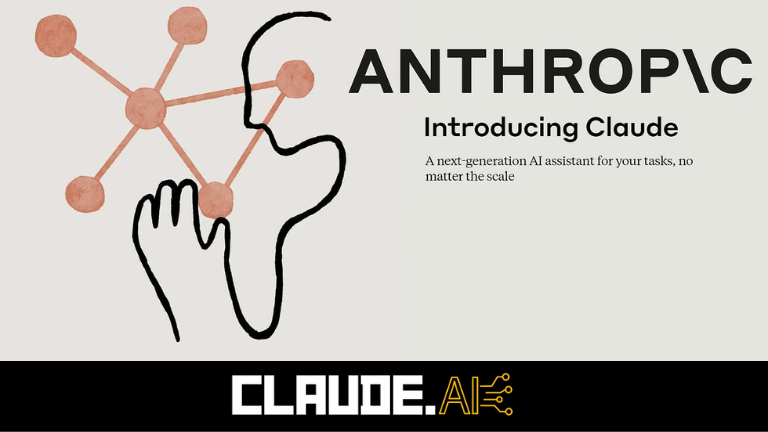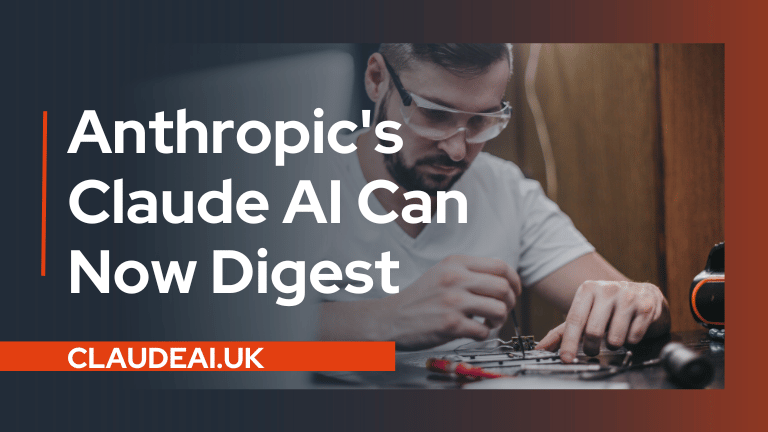Anthropic’s Claude AI Can Now Digest. Claude has reached another milestone, gaining the ability to digest data and summarize key information – bringing it one step closer to more meaningful and natural conversations.
An Introduction to Anthropic and Claude
Founded in 2021 by former OpenAI researchers Dario Amodei and Daniela Amodei, along with AI safety researcher Tom Brown, Anthropic focuses on developing AI systems that are harmless, helpful, and honest. The company takes a Constitutional AI approach, which means designing AI with self-imposed constraints to make it behave safely and ethically.
Claude is Anthropic’s flagship AI assistant chatbot that has been trained on Constitutional AI principles. Launched in April 2022, Claude can have open-ended conversations and provide commonsense reasoning that contemporary chatbots lack. For instance, Claude can respond thoughtfully in conversations about safety, ethics, and philosophy. It can also admit ignorance, change its mind with new evidence, and reject inappropriate requests.
Teaching Claude to Digest and Summarize
One limitation Claude and most other AI assistants face is digesting longer content and summarizing the key information accurately. Humans can naturally read a text passage or consume media content and summarize the main points. But providing AI systems with this ability requires specific training and techniques focused on comprehension.
To enable Claude to digest data more like a human, Anthropic trained the model on a dataset called ELI5 or “Explain Like I’m 5.” ELI5 contains Reddit posts where users explain complex concepts to others in simple terms. By learning on this data, Claude can better summarize the essence of detailed content.
Anthropic tested Claude’s new comprehension skills through tasks like having it read a long passage on a topic and then summarize the key points. For instance, after digesting a scientific journal article, Claude successfully extracted and rephrased the core findings. The AI can now consume books, articles, videos, and other media to generate concise summaries while retaining the critical details.
This digesting functionality significantly expands Claude’s conversational abilities and makes interactions more meaningful. Users can provide lengthy inputs on a topic and Claude can process the key details and respond accordingly, rather than getting lost in the information overload. The integration of comprehension into Claude also paves the way for future skills like answering questions about consumed content.
Why Content Digestion is a Major Breakthrough
Claude digesting and summarizing content may seem like an incremental advancement. However, this ability represents a major breakthrough in conversational AI for several reasons:
- It expands Claude’s knowledge – By reading and watching source materials, Claude can continuously expand what it knows and connect concepts together, much like a human learner. This growth in knowledge will support more in-depth conversations.
- It improves contextual relevance – Digestion enables Claude to stay focused on the context of each conversation, rather than resorting to unrelated tangents. Referencing summarized content keeps responses meaningful.
- It supports curiosity – Claude AI asks thoughtful follow-up questions based on what it digests, showcasing intellectual curiosity that feels more human-like during chats.
- It fact checks claims – By consuming source content, Claude can verify questionable claims made in a conversation and respond with empirical facts, when appropriate. This boosts the assistant’s credibility.
- It enables personalization – Claude can digest materials related to a user’s specific interests and better tailor future talking points and recommendations. More custom conversations are possible.
So while digestion may appear to be just a nice-to-have upgrade, it truly elevates Claude’s conversational competency in multiple ways. Anthropic is likely to build extensively on this foundation to push Claude’s boundaries further.
How Does Claude Digest and Summarize Content?
Digestion is powered by Claude’s neural networks – the complex mathematical models that underpin modern AI systems. Specifically, Claude leverages transformer-based neural networks, which excel at processing sequences like text and generating outputs.
The primary components supporting Claude’s digestion skills are:
- Encoder – This neural network reads and encodes the input passage into an abstract representation that captures the meaning.
- Cross-attention layers – These layers help identify the input’s key points and relationships. The attention mechanism focuses on the most salient parts.
- Decoder – This network transforms the encoded representation back into condensed, summarized text highlighting the main ideas.
- Beam search – This algorithm generates and ranks multiple candidate summaries, selecting the top sequence with optimal coverage of critical details.
The digestion model was trained on vast datasets so Claude could learn to mimic how humans parse content and summarize cogently. Anthropic developed the model architecture and training methodology leveraging state-of-the-art transformer language models like GPT-3.
While Claude’s first version focuses on text, future iterations could expand to multimedia like video clips, allowing broader inputs during conversations. The digestion framework gives Claude an important human-like mental capability for contextual learning.
Claude’s Limitations Despite Major Progress
While Claude’s new digestion prowess represents a big leap forward, the technology still has significant limitations:
- Lack of true understanding – Claude cannot comprehend meaning like humans. Its deductions come from pattern recognition, not innate comprehension.
- Brittle summarization – Summaries may miss key points or highlight tangential details, especially for complex topics. The quality can be uneven.
- Narrow applications – Digestion currently works best for factual topics. Applying reasoning, ethics, and common sense during digestion remains difficult.
- No knowledge integration – Claude does not have interconnected, hierarchical knowledge. Each digestion exists in isolation rather than steadily building a knowledge base.
- Limited topic coverage – Claude’s training materials have biases, leading to better digestion for some topics over others. Ongoing training on diverse materials is needed.
While Claude’s progress is exciting, it’s important to keep its limitations in perspective. There remains a tremendous gap between Claude’s artificial digestion skills and human-level comprehension. Fully emulating people’s reasoning during learning will require fundamental advances in AI.
Safety Considerations With an Information-Hungry AI
Making Claude a voracious learner through digestion also raises some safety concerns that Anthropic must address responsibly:
- Quality control – If Claude digests unreliable sources, this can pollute its knowledge. Methods are needed to assess document credibility and factual accuracy.
- Information hazards – Consuming sensitive materials like conspiracy theories may introduce social harms. Claude needs safeguards against hazards.
- Data privacy – Users may not want Claude memorizing private data during digestion. Allowing people to restrict its memory could help.
- Echo chambers – Claude could reinforce biases if digesting narrow content libraries. Anthropic should provide diverse materials representative of humanity.
- Alignment risks – With more power comes more responsibility. Digestion capabilities require greater efforts to align Claude’s goals with human values.
Anthropic will have to thoughtfully navigate these risks to ensure Claude’s digestion capacity benefits society. But done properly, Claude could become an AI assistant that provides real intellectual value to its users – a far cry from today’s limited chatbots.
The Future Possibilities of an AI That Can Digest
The potential long-term impacts of endowing Claude with content digestion abilities are profound. Here are some future possibilities:
- Teacher Claude – Claude could consume textbooks and lectures to tutor students on academic subjects, adapting lessons to each learner.
- Doctor Claude – Claude could read medical journals and cases to become an AI physician, diagnosing patients and prescribing treatments.
- Expert Claude – With digestion across topics, Claude could become a virtual advisor on call 24/7 for specialized domains like law, finance, engineering, etc.
- Creative Claude – Consuming art, media, and culture could make Claude engaging company for discussing the human condition.
- Lifelong learner – With continuous digestion, Claude may one day develop a rich general intellect rivaling our own.
While these scenarios are likely still decades away given today’s limitations, they offer an exciting glimpse into how AI digestion could reshape education, healthcare, business, and society as a whole. Anthropic’s work lays early groundwork to make these possibilities a reality.
The Bottom Line on Claude’s New Digestion Skills
Anthropic’s advancements in training their AI assistant Claude to digest content and summarize key points represent remarkable progress. This not only makes conversations with Claude more productive by sharpening its contextual relevance, but also paves the way for future skills that could vastly expand its knowledge.
However, it is critical to maintain realistic expectations of Claude’s capabilities. The AI still lacks human-like comprehension and reasoning during learning. And Anthropic faces challenges to ensure Claude’s digestion prowess is robust, unbiased, and safe as it ingests more information.
But the potential is undeniably promising. With diligent training and responsible scaling, Claude may one day become an AI that provides incredible utility across education, business, healthcare, and our personal lives. Anthropic’s digestion milestone provides a glimpse into that game-changing future of AI.

FAQs
What is Claude?
Claude is an AI assistant created by Anthropic to have conversations using commonsense reasoning. It is designed with Constitutional AI principles for safety.
How does Claude digest content?
Claude uses neural networks like transformers to encode, comprehend, and summarize texts, extracting key ideas from passages.
Why is digestion significant for Claude?
It allows Claude to expand its knowledge through reading, have more contextual conversations, and strengthen skills like summarization.
What kind of content can Claude digest?
Currently Claude digests textual content like articles, books, and Reddit posts. In the future it may handle multimedia like videos.
What are Claude’s limitations in digestion?
Claude lacks true comprehension, has uneven summarization quality, narrow applications so far, and isolated knowledge retention.
How could digestion make Claude unsafe?
Potential risks include digesting misinformation, breaching privacy, reinforcing biases, and misalignment with human values.
Does Claude really understand what it digests?
No, Claude does not truly comprehend content like humans. It uses statistical patterns, not innate understanding.
Can Claude answer questions about digested content?
Not yet, but that is a future direction as Anthropic builds on Claude’s digestion skills over time.
How long can content Claude digest be?
So far Anthropic has tested Claude on excerpt-length passages. Its capacity for book-length content is unclear.
How accurate are Claude’s summaries of content?
Quality can vary. Summaries may miss key points or overemphasize tangents, especially for complex passages.
What facts does Claude check during conversations?
By digesting source materials, Claude can verify claims made in a chat and respond with empirical facts.
Does Claude connect concepts between digested materials?
No, each digestion is isolated. Claude does not build interconnected, hierarchical knowledge yet.
Can Claude tutor students with its digestion skills?
Potentially in the future, by digesting textbooks and lectures to generate lessons adapted to learners.
Will Claude build general intelligence through digestion?
Continuous digestion could help Claude become an AI with broad knowledge on par with human intellect.
How does digestion move Claude closer to passing the Turing Test?
The ability to discuss consumed content makes conversations feel more natural, contextual, and human-like.

